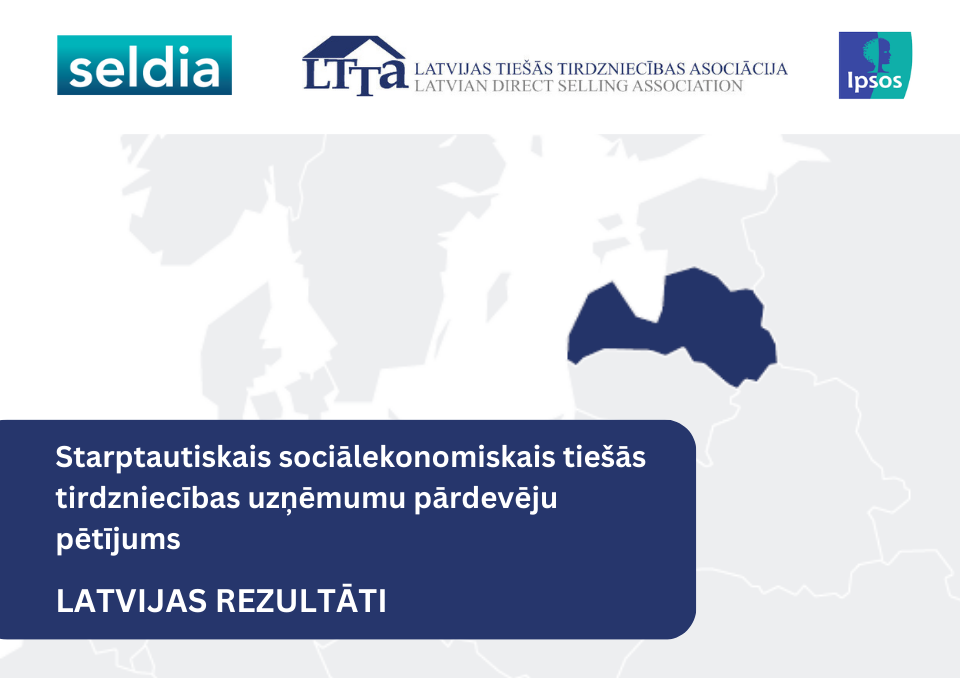- 57% of direct sales consultants value the opportunity to be their own boss;
- In Latvia, 62% of direct sellers-consultants are aged 45-64, 25% are under 44;
- More than half of direct sellers (55%) have been in the field for more than 7 years;
- 39% spend 1-8 hours per week for direct sales activities, 65% are working another full-time job;
- In Latvia last year, direct selling companies generated sales of 78 million EUR.
A large number of people are engaged in direct selling in Latvia and the sector has a solid growth potential,- comments Gintautas Zaleckas, General Secretary of the Baltic Direct Selling Associations, on the first independent study in Latvia that takes a closer look at the direct selling sector, the experience of direct sellers and the potential of the sector.
“Direct selling is not only a way to earn money, but also a way to socialise and improve your sales skills. At the same time, direct sellers appreciate the opportunity to be their own boss, while buyers appreciate advice and tailor-made offers,” he emphasizes.
In Latvia, last year, direct sales reached €78 million and 59.6 thousand people were involved in direct selling. Direct selling continues to grow both in the European Union, with total sales of €28.6 billion and 6 million people involved, and globally (with almost €160 billion and 114.9 million people involved).
Gintautas Zaleckas continues: “Direct selling is a personal and professional development path where each individual creates their own route to success by offering a product in a way that is directly understandable to their audience, maintaining a unique connection and growing their business.” He adds that for some direct sellers this is a money-making opportunity, while for others it is a full-time income-generating job, both online and in-person meetings. At a time when bank lending rates are rising, buyers appreciate the opportunity to shop around for a better deal, and to get insightful advice online or in person from a direct seller who understands their needs.
Two thirds of respondents believe that from direct selling they have gained more than just money. 68% of direct sellers value the opportunity to meet new people, 62% think it is a good way to earn extra income, 61% say the main reason for doing this business is the company’s products, almost as many feel satisfaction from working in this field (60%), as well as being able to improve their communication skills with people (59%), be their own boss (57%), increase their self-esteem (57%). Direct sellers also see the direct selling as an opportunity to improve their business management and sales skills, as well as to earn money while working in another job. Almost half (49%) also believe that direct selling has also improved their teamwork skills.
For many, direct selling is an additional source of income. Women are overwhelmingly more likely to be employed in this field in Latvia, as the direct selling model allows them to combine their business career with family life. 89% of direct sellers in Latvia are women (compared to 90% in Lithuania and 88% in Estonia), 64% of direct sellers have a university degree, the average age is 49 and 63% live in a city.
Zaleckas points out that many direct sellers stay for a long time when they enter the sector: “Direct selling companies in Latvia can be proud of the high level of satisfaction that direct sellers have with their occupation. According to the survey, 40% of direct sellers have been in the industry for more than 10 years, 35% for 4 to 10 years, 16% for one to three years and 9% for less than a year. “Of course, as in other industries, it takes time to achieve success. Our association members do not promise immediate ‘gold mountains’ because we act ethically and responsibly. Instead, we help with advice on how to enter the field so that direct selling would become a way of life,” he says.
Direct selling allows those with other full-time jobs to earn extra income. In Latvia, 43% of direct sellers spend up to one hour a week in this field (18% in Europe), in Latvia and on average in Europe 39% spend 1-8 hours a week in direct selling, 12% 8-29 hours a week (29% in Europe) and a small number (3%) more than 30 hours a week (12% in Europe). Those who spend up to 8 hours a week in the field mainly value the opportunity to buy discounted products and believe in brand values, while direct sellers working more than 30 hours are motivated by independence and flexibility.
In Latvia, direct sellers’ job satisfaction in the sector is very high: 65% are satisfied, 31% are neither satisfied nor dissatisfied, and only 3% are dissatisfied. 81% of respondents said they would continue to work successfully with a direct sales company and 85% would recommend their direct sales company to a friend or colleague.
“Direct selling is not only about high-quality products, but also about personal service and recommendations from the direct seller. They work a lot with existing customers, but they also win new ones, where personal recommendations play a big role,” recalls G.Zaleckas.
62% of direct sellers believe that face-to-face meetings are effective for existing customers, and almost half of them also value a brochure or catalogue (49%), product demonstrations and parties, as well as online correspondence or emails (43%). Some contact their customers by phone (40%), social networks (32%), websites or apps (29%), while in 18% of cases chance encounters are also effective.
In Latvia, 64% of direct sellers have a university degree (40% in Europe) and 29% have a secondary education (55% in Europe). 63% of direct sellers are urban (European average 46%), a roughly similar number of Latvian (17%) and European direct sellers (18%) live in the suburbs, and 18% of Latvian direct sellers and 34% of European direct sellers live in rural areas.
About the study
This is the first independent study of its kind in Latvia, which allows a closer look at the direct selling sector and the people involved in it. The study was commissioned by the European Direct Selling Association-Seldia and Direct Selling Europe and carried out by the global market research agency Ipsos in March-April 2023 using an online survey method. The survey covered 25 896 independent direct sellers of direct selling companies in 11 European Union countries (Czech Republic, Estonia, France, Germany, Italy, Latvia, Lithuania, the Netherlands, Poland, Slovakia, Spain, Sweden), 527 of them in Latvia.


